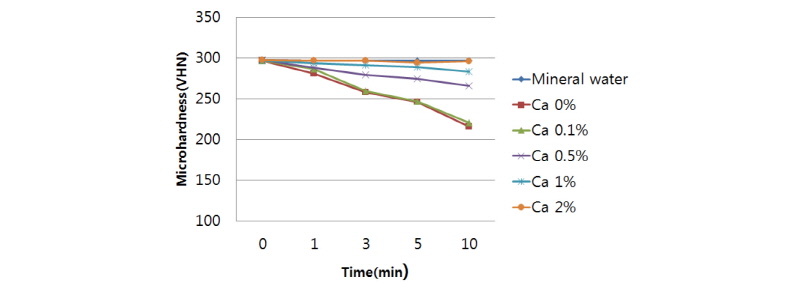Abstract
Objectives: The present study aimed to evaluate the preventive effects of exposure to liquid fermented milk containing various concentrations of added calcium on dental erosion, and to investigate the optimal concentration of calcium effective in reducing dental erosion. Methods: The present study consisted of a total of 6 experimental groups: a mineral water group, a fermented milk with no added calcium (0%) group, and four fermented milk with various concentrations of added calcium (0.1%, 0.5%, 1%, and 2%) groups. Twelve specimens were immersed for 1, 3, 5 and 10 minutes in each experimental drink and the change in surface microhardness was measured. Additionally, the surface was observed using a scanning electron microscope. Results: The difference in surface microhardness before and after 10 minutes of immersion in the experimental drink was the highest in the Ca 0% group, followed by the Ca 0.1%, 0.5%, 1%, 2% group and the mineral water group, in that order. The groups with a calcium concentration of more than 0.5% showed statistically significant differences in surface microhardness compared to the Ca 0% group. In addition, when the surface morphology of enamel was observed under a scanning electron microscope, the results showed that the highest level of surface damage was observed in the Ca 0% group, followed by the Ca 0.1%, 0.5%, 1%, 2% group, in that order. Conclusions: The present study confirms that a higher calcium concentration in fermented milk is associated with a higher possibility of preventing dental erosion. The addition of 0.5% calcium, which is a relatively low concentration, did not completely prevent dental erosion, but significantly inhibited dental erosion compared to fermented milk without any added calcium. Therefore, it is suggested that consumers should be educated and provided with guidance to consider the calcium content when choosing fermented milk.
Acknowledgements
이 논문은 전남대학교 학술연구비 (2014-2298) 지원에 의하여 연구되었음.
Figures & Tables

Changes in enamel surface microhardness (VHN) over exposure time to the experiment drinks. The comparision between groups was performed using the repeated measures ANOVA *p<0.05


